Home | Category: Jewish Laws and Money
JEWISH LAWS AND RULES
 Jews have traditionally placed great importance on abiding by the laws and rules set forth in the Torah and regard it as a religious duty to follow them. Jewish Law is called the “Halakah” , which literally means “that by which one walks.” It is comprised of the laws laid out in the Torah and Talmud and interpretations of these laws. “Torah she-bi-khtav” is the written law.
Jews have traditionally placed great importance on abiding by the laws and rules set forth in the Torah and regard it as a religious duty to follow them. Jewish Law is called the “Halakah” , which literally means “that by which one walks.” It is comprised of the laws laid out in the Torah and Talmud and interpretations of these laws. “Torah she-bi-khtav” is the written law.
Judaism was originally a theocratic religion like Islam in which there was a set of religious laws for a Jewish kingdom. After the diaspora, laws and rules were established that became a way of defining and uniting Jewish communities.
Almost every aspect of a Jew’s life and every act of everyday living — from eating to dressing to working — has some religious aspect attached to it. Almost all aspect of life are governed by strict religious practices and rules. Jews regard it as a duty to observe the Sabbath and Jewish holidays, eat certain foods, performing specific rituals like the lighting of candles, and attending the synagogue. The are special blessing that are uttered when an Jew eats, smells a flower or puts on clothes in the morning.
Websites and Resources: Virtual Jewish Library jewishvirtuallibrary.org/index ; Judaism101 jewfaq.org ; torah.org torah.org ; Chabad,org chabad.org/library/bible ; BBC - Religion: Judaism bbc.co.uk/religion/religions/judaism ; Encyclopædia Britannica, britannica.com/topic/Judaism; Yivo Institute of Jewish Research yivoinstitute.org ; Jewish Museum London jewishmuseum.org.uk ; Jewish History: Internet Jewish History Sourcebook sourcebooks.fordham.edu ; Aish.com aish.com ; Jewish History Timeline jewishhistory.org.il/history Jewish History Resource Center dinur.org ; Center for Jewish History cjh.org ; Jewish History.org jewishhistory.org
Mitzvot: Jewish Commandments
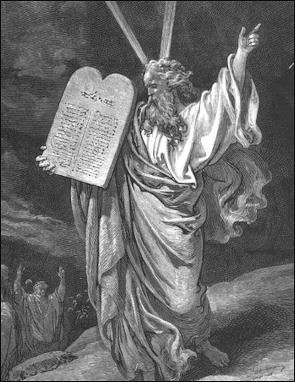
Moses with the Ten Commandments
Dara Lind of Vox wrote: “Judaism is a religion of commandments. There are, famously, 613 commandments in the Torah alone (at least as counted by one of the authors of the Talmud, one of the major books of Jewish law). In Hebrew, these are the mitzvot — the plural of mitzvah, which is one of those Hebrew words that's crossed into English via Yiddish. In English-via-Yiddish, a mitzvah sounds like a favor: "It would be a mitzvah if you did the dishes after Seder." That's because Yiddish is an irony-heavy language and American Jews are masters of the guilt trip. A mitzvah is really a commandment, just like tzedakah — often translated as "charity" — is really an obligation to give. [Source: Dara Lind, Vox, April 22, 2016 |=|]
“Kosher dietary restrictions — the year-round kind, not the Passover kind — forbid the eating of shellfish? Think about it — shellfish can often make you sick in hot climates, especially at certain times of the year, and it was probably safer to avoid them. Judaism forbids graven images? Think about it — the earliest Jews lived among polytheistic tribes with idols for everything; worshiping only one god, a god too powerful to have a face, was certainly one way to set themselves apart. |=|
“Later, as an anthropology student in college, I'd learn that this sort of thinking was called structural functionalism — the determination to see a culture as an organism, evolving in response to its environment to keep its members alive and its community cohesive — and that there were other ways to make meaning out of society. But it worked as far as it went. The problem is that some rules simply cannot be logicked. You cannot logic your way into the rules of kitniyot” (Passover dietary restrictions). |=|
Social Justice in Judaism
Paul Mendes-Flohr wrote in the Worldmark Encyclopedia of Religious Practices: The unyielding pursuit of justice is one of the overarching themes of the Bible: "Justice, justice shall you pursue …" (Deut. 16:20). Initially addressed to judges, beseeching them to administer the law with integrity, this injunction was interpreted both in the Bible itself and in later Jewish teachings as a commandment to be alert to the needs of disinherited members of society: the poor, the widowed and orphaned, the stranger, and the physically and mentally infirm. Indeed it is held that, unaccompanied by the pursuit of justice, the worship of God is vacuous: "Spare Me the sound of your hymns, And let Me not hear the music of your lutes. But let justice well up like water, Righteousness like an unfailing stream" (Amos 5:23–24). The rabbis recognized that justice must be grounded in the law and in a society's institutions. [Source: Paul Mendes-Flohr Worldmark Encyclopedia of Religious Practices, 2000s, Encyclopedia.com]
Hence, rabbinical law (Halakhah) is an ongoing process — until this day in Orthodox communities — of review and refinement, representing a quest to understand how God's will, as embodied in the Torah and its principles, apply to the ever unfolding complex realities of life. The Bible sets forth certain criteria for social justice. Among these is that charity, the Hebrew term for which is derived from the word for "justice," should avoid humiliating the recipient. The needy are not to expose themselves to the humiliation of begging. The philosopher Maimonides therefore taught that the highest and purest form of charity is constituted by actions that prevent a person from becoming poor or that assist a person emerging from poverty by providing a decent job or other help. Implicit in this dictum, as many modern interpreters underscore, is the premise that the alleviation of suffering by individual acts of charity alone is insufficient. Equally if not more important is the establishment of just social institutions and laws.
Judaism and the Law

Ultra-Orthodox clothing and hairstyle are derived from Jewish laws and East European traditions
Dara Lind of Vox wrote: “Judaism is also a religion of jurisprudence. Often, that's a fancy word for arguing — one of the stories in the Haggadah, the script for the Passover Seder, ends with the so-called "punchline" of four rabbis being interrupted in a heated discussion by their students telling them the sun has risen and it's time for breakfast. (The real punchline is that subsequent Jewish scholars have tried to explain away the unfunniness of this joke by dissecting its symbolism in the margins of the Haggadah.), [Source: Dara Lind, Vox, April 22, 2016 |=|]
“Remember, though, that the default state of Jews is diaspora: the dispersion of Jewish peoples throughout the world, and the term used for any Jew living outside of Israel (which described every Jew until the modern Israeli state was created in the late 1940s, and describes most of us today). Diaspora gave rise to the Askhenazi tradition of Eastern Europe and Russia, and the Sephardi tradition of the Mediterranean — distinctions of culture that nonetheless gave rise to certain differences of interpretation. "Among Conservative Jews (and those of us less observant still), the question is simply how many of the rules we ignore". |=|
“In diaspora, jurisprudence is a crucial tool: a way for rabbis to try to make sense of new experiences and edge cases that the five books of Torah didn't cover or anticipate. We can abide by it unquestioningly, for the simple reason that if it was good enough for our ancestors it is good enough for us. (You might be familiar with the song "Tradition" from the musical Fiddler on the Roof, but you might have forgotten that this too is ironic — "Why do we do these things?" narrator Tevye asks the audience. "Nobody knows.") |=|
“We can try to carve out exception upon exception to rule upon rule, using the law against itself. (Faced with the difficulty that multi-story apartment buildings posed to the rules against operating machines on the Sabbath, the rabbis and the engineers devised a solution: Pressing an elevator button was forbidden, but riding in an elevator programmed to stop on every floor would work.) We can kvetch about it. (Moses hears a voice from the heavens: "Thou shalt not boil the kid in its mother's milk." "Aha," says Moses, "you mean we can't mix milk and meat during meals!" The voice repeats: "Thou shalt not boil the kid in its mother's milk." "Aha," says Moses, "we have to use separate dishes for meat and milk and wait six hours between the two!" Etc. Finally, the voice sighs thunderously: "Fine. Have it your way...") |=|
“Or we can simply ignore it. Among Conservative Jews (and those of us less observant still), the question is simply how many of the rules we ignore. It can be hard to grasp that the distinctions among various sects of Judaism (not to mention the wide and growing variety of Jewish practices outside established synagogues) aren't about theology but about observance: how many, and which, rules are followed. The technical term for this is orthopraxy — correct actions, as opposed to orthodoxy (correct thoughts). It's a key distinction between Judaism (and Islam, for that matter) and Christianity. |=|
“The education, deliberation, and questioning inherent in the tradition of Jewish arguing and jurisprudence — these are unquestionably Jewish values. So is the commitment to social justice inherent in the obligation of tzedakah. No one would argue that these values are unique to Judaism. But their expression within Judaism is a big part of why they're so important in so many Jewish homes — and to many people who grow up in those homes.” |=|
Views on Following Jewish Laws Sincerely or Simply Going Through the Motions
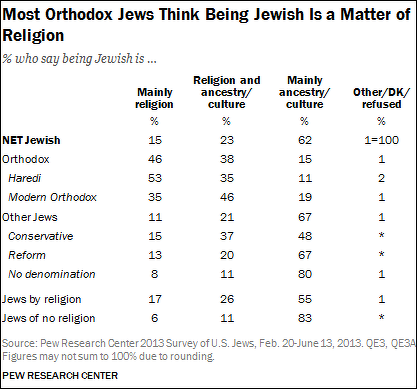
Dara Lind of Vox wrote: Some jews believe that “the point of their Judaism wasn't what they believed but what they did. To orthodox Jews, this is monstrous: a sickness of modernity. They can't abide the idea of Jews going through the motions to serve a deity in whom they may not believe; to them, this is precisely how Judaism gets reduced from a religion to a culture. [Source: Dara Lind, Vox, April 22, 2016 |=|]
“And to many Jews who grew up being told to follow at least some of the commandments without any way of reconciling those actions with their beliefs — Jews like my father and the parents of the kids he taught at Sunday school, Jews like many of my peers — it's pointless. They find no meaning in the rituals themselves, and "because your ancestors did it" doesn't carry much more weight than "because I said so." To them, this is the religion they abandon, even if they acknowledge at least some of Jewish culture — the food, the kvetching, the Yiddish — as their own. But few people are introspective enough to know the precise origins of every trait they've inherited from their parents or been raised with in their homes. People can't always judge what, in their upbringing, was Jewish and what was not. |=|
“When people slough off orthopraxy as meaningless ritual, they're putting practices and customs in a mental attic, in a box labeled "Judaism" — and leaving it at that. They're cutting off an alternative mode of inquiry: thinking about what they have inherited because of Judaism. "I'm far more Jewish during Passover than I am during any other time of year" This sounds like trivializing Judaism, the faith of my ancestors, a culture that has sustained my people for thousands of years. I'd argue that even if it were trivializing, it wouldn't be less so than simply foregoing the practice entirely and dooming it to die. |=|
“But it isn't. It's orthopraxy. Judaism roots its values in obligations. You must give tzedakah. You must honor the Sabbath as a day of rest and study. You must be present in the temple on the High Holidays to seek forgiveness for the misdoings of the past year. You must, for eight days, eat matzah — "the bread of affliction" that is also the bread of freedom. And sure, you can put peanut butter on it. You can spend eight days eating quinoa and rice. As for me, I'd need a better reason to abandon the stricter rules about kitniyot than that following them is hard.” |=|
Torah Law
The Torah contains 613 commands: 248 positive ones and 365 negative ones, each of which is associated with a specific part of the body. Believed to have been given to Moses by God, these include the Ten Commandments, which hold a central place in Jewish law, as well as rules on food, hygiene, morality and rituals. Jews believe these laws are part of their Covenant with God as God’s chosen people.
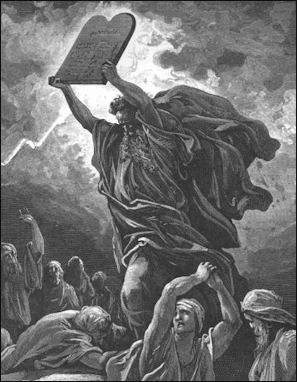
Moses Breaks the Tablets of the Law Jews are required to follow the 613 commandments in the Torah. Following them is regarded as an affirmation of their covenant with God. These laws are followed without questioning even if they seem arbitrary or silly. These laws are regarded as an expression of love: by God as a way of allowing mankind to redeem itself for causing disharmony and trouble, and by mankind as a way of expressing emotion and gratitude to God. “Mitzvah” literally means “commandment” but is also interpreted as meaning “good dead” or “religious act.”
Ten Commandments
"And it came to pass...that there were thunders and lightnings...And Mount Sinai was altogether on a smoke, because the Lord descended upon it in fire....
"And God spake all these words, saying.
"I am the Lord they God..."
"Thou shalt have no other gods before me. [1]
"Thou shalt not make unto thee any graven image... [2]
"Thou shalt not take the name of the Lord thy God in vain... [3]
"Remember the sabbath day, to keep it holy... [4]
"Honour they father and mother [5]
"Thou shalt not kill. [6]
"Thou shalt not commit adultery. [7]
"Thou shalt not steal. [8]
"Thou shalt not bear false witness... [9]
"Thou shalt not covet... [10]
The ban on graven images means that believers may not worship or bow down to idols or even images that attempt to capture the one true God. The understanding is that God is so powerful and overwhelming that he can not be conveyed in an image. He can be worshipped as a spirit.
The ban on using God’s name in vain is reminder that using God’s name is not something that should be taken lightly. Traditionally, Jews have not even used his name at all. Instead they referred to him as “Adonai” (The Lord) and “HaShem” (The Name). The Seventh Commandment forbids adultery (extramarital sexual relations) not fornication (premarital sexual relations) . This is because Jews traditionally married very young so fornication was not regarded as a problem while adultery was a community problem because it called into question the legitimacy of children.
Ark of the Covenant
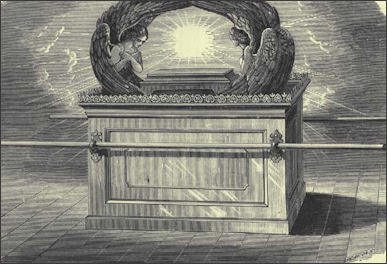
Ark of the Covenant The words of the Ten Commandments were written on two stone tablets with the "finger of God.” The Ark of the Covenant is a wood-and-gold chest built by Moses to house the Ten Commandments. It is believed that the Ark was kept in the First Temple built by King Solomon in Jerusalem. According to one legend it was stolen by the illegitimate son of Solomon and Sheba and taken to Ethiopia in the 10th century B.C. It was placed first on an island Mesa in Lake Tana, where its was watched over by a band of monks, and then taken to a church in Aksum, where the Ethiopian Orthodox Church became its chosen protector.
At Aksum the ark has been watched over by a single virginal monk who, once chosen for this lifetime appointment can never leave the iron-fenced chapel grounds. No one is allowed behind the red curtains that shields the ark from view, lest they, according to legend, fall ill and die. Most scholars don’t think the ark is really there and it has became a matter of faith whether it is or not. Ethiopia’s Patriarch Abune Daulos said in 1999, “We don’t have to prove it to anyone. You want to believe, it’s your privilege. If you don’t want to believe, it’s you own privilege again.”
It is not even clear what is meant by the ark. Does that mean the stone tablets themselves or does it refer to the box they were kept in or is it a reference to the building as repository of faith. The power of the place is said to be the fact it s closed to the outside world and the mystery of what lies within.
See Separate Article: ARK OF THE COVENANT africame.factsanddetails.com
Talmud Law
The laws of the Torah have been adopted to a changing world by interpretations by rabbis, whose role is to apply an interpretation the laws to new circumstances and situations as they arise. Even so, the basic interpretations of the laws were fixed in the centuries that followed the destruction of the Second temple (A.D. 70). After the interpretations of the laws were worked out to smallest detail. The result was the Talmud,
The Torah does not provide instruction on all matters. After the Jews were exiles, laws addressing these issues were gathered and debated by rabbis
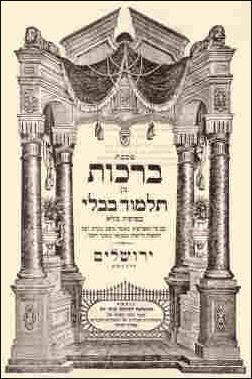
Talmud The second most important document in Judaism after the Torah is the “Talmud” , a collection of Jewish laws, traditions, poems, anecdotes, biographies, prophecies and rabbinical interpretations of scriptures and commentaries. The Talmud is divided into the “Mishna” (text) and the “Gemara” (commentary about the “Mishna” ).
The Talmud is primarily a collection of interpretations of the Torah and a record of the oral tradition of the Jews. The codification that led to the Talmud was done to avoid the dissolution of Judaism by providing laws and guidance for situations not addressed in the Torah.
The Talmud took 500 years to put together. It began as a set of oral laws, interpretations of the Torah and applications of Torah to new situations. Around A.D. 200, these laws were written down by Rabbi Judah ha Nasi. This became the Mishna. For the next 200 years these interpretation were debated and updated. This resulted in the Gemara. Around A.D. 500 the Mishna and the Gemara were further updated and combined by the Babylonian Rabbi Rav Ashi. This became the Talmud.
Over time several Talmuds were written. Many passages were written in Aramaic, the language of Jesus. The main ones are Babylonian version complied by Rav Ashi and the Palestinian version. These were later organized into summaries to help readers understand them better. The most well known of these are the code of Maimonides (1135-1204) and Joseph Caro (1488-1575), known as “Shulchan Aruch” .
The Talmud can derives an extraordinary number of laws and ideas from a simple sentence or phrase. Kosher food is a good example of how the Talmud derives an extraordinary number of laws and ideas from a simple sentence or phrase. The sentence “Thou shall not eat anything with the blood” (Leviticus xix 26) is taken to mean that one can not eat: 1) any animal that still has life in it; 2) any animal parts that still have blood in them; 3) before one prays for pure life (based on the connection of blood with life); 4) sacrificial meat while blood is still in the basin; 5) on the day a judge gives out a death sentence. Connected with the prohibition is warning that gluttony will lead one down the road to ruin.
Jewish Laws, Morality and Love
The emphasis in Judaism is on ethical behavior, with Orthodox Jews also emphasizing traditional, careful ritual observance. Jews have traditionally felt that performing good deeds is something that comes from the heart not from a desire for rewards.
Jews believe that all people are created equal and have their own version of Confucius's Golden Rule. According to the Talmud (Shabbat, 31a): "What is hateful to you, do not to your fellow men. That is the entire Law; all the rest is commentary." According to Leviticus, "Love your neighbor as thyself."
On the issue of tolerance. Isaiah "My thoughts are not your thoughts, nor my ways your ways."
Jewish Sabbath rules, See Holidays
Jewish Courts
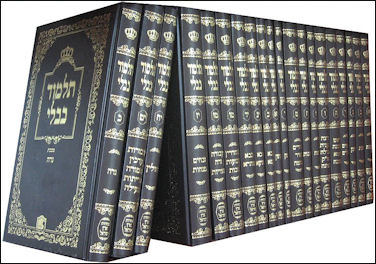
Talmud set Throughout history, justice has been carried for Jews by Jewish courts as well as courts in the places where Jews live. In Israel today, Jewish courts deal with many civil matters such as marriage and divorce. No Jewish courts have had the power to impose a death sentence since Jesus's time.
In Israel Religious courts make decisions on education and “private affairs, including child custody, marriages and divorce.” This was a decision that was made early in Israel’s history to win the support of ultra-Orthodox Jews for the Zionist state. The religious courts are so powerful that they have defied Supreme Court decisions that called for them appoint Reformist members.
Image Sources: Wikimedia Commons
Text Sources: Internet Jewish History Sourcebook sourcebooks.fordham.edu; “World Religions” edited by Geoffrey Parrinder (Facts on File Publications, New York); “ Encyclopedia of the World’s Religions” edited by R.C. Zaehner (Barnes & Noble Books, 1959); “Old Testament Life and Literature” by Gerald A. Larue, New International Version (NIV) of The Bible, biblegateway.com; Wikipedia, National Geographic, BBC, New York Times, Washington Post, Los Angeles Times, Smithsonian magazine, Encyclopedia.com, Library of Congress, The New Yorker, Reuters, AP, AFP, Lonely Planet Guides, and various books and other publications.
Last updated March 2024
